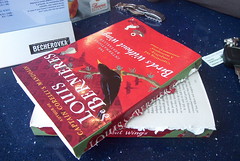38. Midnight’s Children, by Salman Rushdie
This is the most densely verbose, intricate and complex book I have read by that most densely verbose, intricate and complex author, Salman Rushdie. I first read it ten years ago on a crap holiday in Portugal, and it was the sole redeeming feature of the entire week, which gave it automatic status as my favourite book ever. I admit now that this was something of an over-reaction, but also acknowledge what I have recently learned, which is that I am no longer wowed by things that are not new. It’s still a good solid book.
In the story, two children who are born at the midnight moment that India becomes an independent nation, are swapped at birth; what follows is a mystical exploration of nature versus nurture, animated by characters with special powers, magic and miracles, deformity and cucumbers. Oh yes, this is a book in which the uborka has a special place.
4/5
39. Birds Without Wings, by Louis de Bernieres
When Amazon kindly gave me a voucher for my referrals, the first thing I saw on the site was this book, at a bargain price; so I ordered it for my holiday. Turns out that Doctor P had just done the same thing, so we are able to compare notes, but for some reason haven’t actually got round to it yet.
BWW is similar to Captain Corelli’s Mandolin, with the personal/social/interesting side of the story running parallel to the political/war/interminably dull side. Even if you skim those bits, it is quite educational on the demise of the Ottoman Empire and the wars between Turkey and Greece. At one point, characters and events from CCM even leak into the book, which self-indulgent dash of transtextuality will make you smile when you recognise it.
Set in an isolated village where Christians and Muslims live together interdependently, the individual tales start in harmony with the birth of a beautiful child. All de Bernieres characters are drawn with wit and colour, which makes it so peculiar that he manages to write the dreary passages on the progress of the war. By the time the Lausanne Agreement rips apart the comfortable little village, the individual lives have already been devastated by war.
This is definitely set up for a sequel, as we never find out what happens to the people who were deported to Greece, and this is almost as unsatisfactory as the ending of CCM. I had the impression that de Bernieres was writing a much longer novel, and had to suddenly stop and publish what he had got so far.
4/5
This book was historically torn apart at Prague Airport, when Pete ran out of reading material.

40. Regeneration, by Pat Barker
This is a very interesting book, the first of a trilogy. I randomly read the third book a few years ago, and the second is now on my wishlist. It is a semi-fictional account of Siegfried Sassoon’s brief stay in a mental hospital in 1917, following his protest against the continuation of the war. Apparently the mental hospital was a better alternative to a court martial. One wonders how he would have been treated today.
As well as being thoroughly-researched on the life of Sassoon, it is also a good examination of the early development of psychological medicine. During the First World War, almost all treatment for stress-based disorders was experimental, and the comparison of a counselling-based technique with the application of electricity to a psychosomatic mute appealed very much to the deeply-buried psychology student within me.
This was one of those books that I wish I could have written.
5/5

I love Midnight’s Children! Great book.
I’m loving that you tore the book in half to share with Pete.
I’d do anything for Pete; even deface a book.
Great love hath no woman.
Greater love hath no woman.
Greatest love hath no woman.
Kiss my superlative.